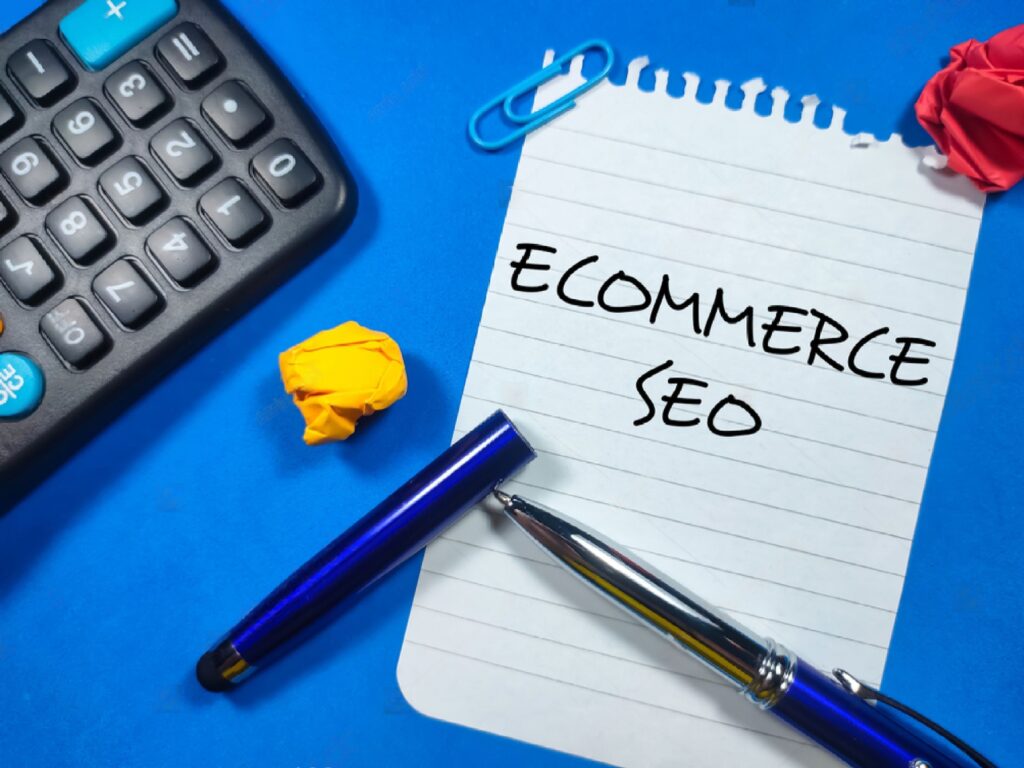If you have an eCommerce website, it’s important to make sure your site is optimized for search engines.
SEO, or search engine optimization, is the process of improving the ranking of a website on search engines. This is done by optimizing the website content and structure, as well as building backlinks from other websites.

Digital The Basics of eCommerce SEO.
By optimizing your website for SEO, you can improve traffic to your site and increase sales. In fact, studies show that businesses that invest in SEO see an average return on investment of $11 for every dollar spent.
To learn more about eCommerce SEO and how it can help your business, visit our website today!
The Importance of SEO for e-Commerce Websites
As the world of online business becomes more and more competitive, it is important to make sure that your eCommerce website is ranking high in search engine results. This is where SEO (Search Engine Optimization) comes in. By optimizing your website for search engines, you can increase your chances of being found by potential customers who are looking for what you have to offer.

Benefits of SEO for ecommerce websites.
There are a number of benefits that come with ranking highly on search engines. If you are one of the search engine users, you need to know the following:
1. More traffic to your website: Top rankings in search engines mean more people will visit your website. This can lead to increased traffic and more customers for your business.
2. Increased brand awareness and visibility: When people see your website at the top of the search results, they’ll be more likely to remember your brand. This can lead to increased brand awareness and visibility for your business.
3. More leads and sales: Top rankings can lead to more leads and sales for your business. People who find your website in the search results are more likely to contact you or buy from you than those who don’t.
4. Improved ROI: Search engine optimization can produce a higher ROI than many other marketing activities. This is because it can target people who are actively searching for your products or services and because it can lead to increased traffic and sales.
5. Greater website usability: A well-optimized website is easier to use and navigate, which can make it more user-friendly. This can lead to increased traffic and improved conversions.
6. Lower marketing costs: Search engine optimization is a cost-effective marketing strategy. It can save you money on paid advertising, and it can help you reach a wider audience with your marketing message.
7. Increased web traffic: One of the main goals of SEO is to increase web traffic. By improving your website’s ranking in the search results, you can increase the amount of traffic that your site gets. This can lead to more customers and more sales for your business.
8. Greater customer reach: SEO can help you reach a larger audience with your marketing message. By improving your website’s ranking in the search results, you can reach more people who are looking for your products or services.
9. More targeted traffic: SEO can help you target a specific audience with your marketing message. By optimizing your website for search engines, you can reach people who are specifically searching for the products or services that you offer.
Don’t you know that E-commerce traffic came from online searches, so that means the more searches online the more traffic to your website?
10. Improved website conversion rates: One of the goals of SEO is to improve website conversion rates. By optimizing your website for search engines, you can make it easier for potential customers to find your site and take action. This can lead to more sales and improved ROI for your business.
By following these tips, you can optimize your eCommerce website for search engines and attract more potential customers to your online business.
What is an E-commerce SEO?
E-commerce SEO is the practice of optimizing an online store for Search Engines. The goal of eCommerce SEO is to generate organic traffic that converts into sales.
The process of optimizing an eCommerce website for search engines can be divided into two parts: on-page optimization and off-page optimization.
On-page optimization deals with optimizing the individual pages of an online store for search engines. This includes optimizing the title tags, meta descriptions, header tags, images, and other elements on a page.
Off-page optimization deals with building backlinks to an online store from other websites. Backlinks are one of the most important ranking factors for search engines. By building high-quality backlinks, you can improve the visibility and organic traffic of your online store.
E-commerce SEO is a complex and ever-changing process. However, by following the tips in this guide, you can create a solid foundation for your eCommerce SEO strategy.
All-In-One Suite of SEO Tools

Don’t miss out on traffic! Use SEO Tools!
The All-In-One Suite of SEO Tools is the most comprehensive set of tools for helping you improve your website’s search engine optimization. With these tools, you can track your website’s traffic, find new keywords, and optimize your site for better ranking. The suite includes a variety of tools for link building, keyword research, and web page optimization. With these tools, you can improve your website’s SEO and get more traffic.
Powerful Backlink Data for SEO
Creating backlinks is an important part of any SEO strategy, as they can help to increase both the quantity and quality of traffic to your site. However, it’s important to create backlinks that are both relevant and powerful in order to see the biggest benefits for your website.
There are a few different ways that you can use competitor backlink data to improve your own SEO strategy. Here are a few of the most effective:
1. Find link opportunities that your competitors are missing
2. Analyze the anchor text of your competitor’s links
3. Study the link profiles of your competitors
4. Replicating their successful strategies
5. Finding new opportunities for link bait.
By looking at the backlinks of your competitors, you can not only get an idea of where they’re getting their links from but also what type of link is most valuable to them.
Strategy for Ecommerce websites
e-commerce SEO guide will cover all the essentials of SEO for e-commerce websites and offer advice and techniques for successfully optimizing your website.
Summary SEO strategy for eCommerce websites can be difficult and time-consuming to adopt, but if you follow the recommendations in this eCommerce guide, it will be worth the effort.
Keyword Research for e-Commerce Websites

KW research – All you need to know.
What distinguishes keyword research for e-commerce sites from that for blogs or other websites? What should you consider when looking for keywords to target for your e-commerce blog, product pages, or product categories?
In contrast to the purpose you have on a “regular” website, which is to increase traffic, your main objective when operating an e-commerce website is to increase sales.
You don’t need any kind of traffic, but you do need focused traffic and, more importantly, traffic that converts, if you want to increase your sales.
While there are numerous strategies to improve the traffic to your website and numerous reasons why this hasn’t happened yet, it all begins with effective keyword research.
Any time you invest in conducting keyword research for your online store, particularly in the beginning, will pay off in the form of traffic and sales in the future.
Why is keyword research so important for eCommerce content?
Keyword research is the foundation of every SEO strategy, especially when it comes to onsite SEO. Done well, it provides direction for what type of content you should be optimizing for. Take note too, to avoid using duplicate content as this is considered a common SEO issue for e-commerce concerns. On the other hand, a good keyword with a badly executed strategy won’t help you make sales in your e-commerce store.
If you want to know the benefits of SEO, utilize each and every page and paragraph of your e-commerce website.
Why is keyword research important?
Knowing what people are looking for, can help us provide the search engines with the right content and also give our readers content using terms (terminology and context) they can understand.
Take Google as an example, their mission is to show high-quality websites in their search results, that answer users’ queries.
If you want to increase your chances of ranking higher on Google, you need to give Google the right signals when crawling the content of your pages and one of the ways to do this is through keywords (based on the results of keyword research).
Keyword Gap can also help you in identifying the right keywords that you are going to map.
Higher rankings are equivalent to more traffic. As shown in the graph below, websites that appear at the top of the SERPS get more than 60% of search engine traffic.
What are some tips for doing eCommerce keyword research?
1. Use keyword research tools such as Google Adwords Keyword Planner and semrush.com to find keywords that are relevant to your business.
2. Think like a customer and try to anticipate the search terms that they would use when looking for your products or services.
3. Use long-tail keywords which are specific and descriptive phrases that are more likely to convert into sales.
4. Use negative keywords to filter out irrelevant traffic.
5. Monitor your keyword rankings over time and adjust your SEO strategy accordingly.
There are many types of keywords. Having said that, the following are some fundamental categories of keywords you should be aware of: Long-tail keywords, often known as searches with two or more words on Google, but it would be more correct to refer to them as keywords with low search volume.
Take note: Instead, prioritize ranking for less competitive keywords on particular product and category pages to get your brand noticed in the SERPs.
By following the tips above, you can do eCommerce keyword research effectively and find the right keywords that will help you increase traffic and sales for your online store.
How to find keywords for your e-commerce product and Category pages?
Let’s see how you can practically find which keywords have commercial intent and are easier to target.
Step 1: Amazon
Step 2: Use Google Search
Step 3: Use your Favorite Keyword Tool
Step 4: Use the Google Keyword Tool
Step 5: Steal Your Competitor’s Keywords
The Following keywords will be some of your guides in doing your keyword research:
- Product-Focused Keywords
- Related-Vertical Keywords
- Search Intent Keywords
- Semantic Keywords
- Broad Keywords
Why SEO Is More Important Than Ever for E-Commerce Sellers?
The e-commerce landscape is constantly changing, and sellers need to adapt their strategies to stay ahead of the curve. One of the most important things that e-commerce sellers can do is invest in search engine optimization (SEO). There are a number of reasons why SEO is more important than ever for e-commerce sellers.

Smart eCommerce Sellers use SEO to boost their Business online!
First, SEO can help you reach more customers. More and more people are using search engines to find products and services online.
Second, SEO can help you stand out from the competition. With so many e-commerce sites vying for attention online, it’s important to make sure your site stands out from the crowd. Investing in SEO can help you achieve this by improving your site’s visibility and ranking in search results.
Third, SEO can help you boost your sales. A well-optimized e-commerce site can generate more traffic and conversions, which can lead to increased sales.
Fourth, SEO can help you build trust and credibility. When customers see that your site is appearing in search results, they’ll be more likely to trust your brand and make a purchase from you.
Fifth, SEO can help you save money. Investing in SEO can actually save you money in the long run by helping you avoid paying for costly advertising.
Overall, there are a number of reasons why SEO is more important than ever for e-commerce sellers. If you want to stay ahead of the competition and reach more customers, you need to make sure your site is optimized for search engines.
Here’s a step-by-step guide to help you get started:
1. Conduct keyword research.
Keyword research is the first and most important step in any SEO campaign. That’s because, without keywords, you won’t be able to optimize your website or content for search engines. To do keyword research, you need to find out what keywords people are searching for that are related to your business like looking for the common keyword, the primary keyword, or the relevant content. There are a few different ways to do this. One way is to use a keyword research tool like Google AdWords Keyword Planner or Moz Keyword Explorer. Another way to do keyword research is to simply do a Google search for your seed keywords. Scroll through the results and take note of any relevant keywords that you may want to target. You can also use keyword opportunities in conducting your keyword research.
- Transactional Keywords – Transactional keywords are keywords or keyword phrases potential customers use to find the services or products they are looking to buy. Search engine users will use transactional keywords to find the right place to purchase their product. This can both be online or offline, depending on the product or service.
- Buyer Intent Keywords – Buyer intent keywords are search queries that show someone is actively looking to make a purchase. Once you know the buyer intent keywords that your ideal customers are using, you can start to target them with relevant content or paid ads.
2. Optimize your website’s title tags and meta descriptions.
Once you have a list of keywords, it’s time to start optimizing your website. One of the first things you should do is update your website’s title tags and meta descriptions. Your title tag is the clickable headline that appears in search engine results. And your meta description is the short piece of text that appears underneath your title tag. When optimizing your title tags and meta descriptions, you want to include your target keywords. But you also want to make sure that they’re readable and click-worthy.
You can also add product descriptions to your product online.
3. Optimize your images.
Another important thing to do is optimize your website’s images. When you optimize your images, you’re essentially telling search engines what your images are about. This helps them understand your website better and makes it more likely to show up in image search results. To optimize your images, start by giving each image a relevant file name. For example, if you have an image of a red dress, you might name it red-dress.jpg.Then, add alt text to each image. Alt-text is a short piece of text that describes an image. It’s important because it helps search engines understand what an image is about.
Finally, make sure your images have the right size. Large images can slow down your website, which can hurt your SEO. So make sure to resize your images before you upload them to your website.
4. Build backlinks.
One of the most important things you can do for e-commerce SEO is to build backlinks to your store. Backlinks are basically links from other websites to yours. They help improve your store’s search engine ranking and can also lead to more traffic. To build backlinks, you need to reach out to other websites and ask them to link to your store. This can be done by sending emails or by leaving comments on blog posts. You can also submit your website to directories and create high-quality content that other people will want to link to.
5. Monitor your progress.
Once you’ve implemented all of these e-commerce SEO tips, it’s time to start monitoring your progress. The best way to do this is to use Google Analytics. This free tool will allow you to track your website’s traffic and see how your ranking is improving over time. You can also use other tools like Moz Rank Tracker and Ahrefs to track your progress. Ecommerce SEO is a great way to improve your store’s visibility and ranking in search engine results.
By following the tips in this guide, you can optimize your store for e-commerce SEO and start driving more traffic and sales.
What is keyword difficulty and why is it important when choosing keywords?
Keyword difficulty is an important metric to consider before selecting your target keywords. It tells you how easy or difficult it is for you to rank for that keyword. The higher the difficulty score, the more difficult it is to rank for that target keyword.
Reasons Why E-Commerce Websites Need SEO
Many online businesses overlook the importance of SEO for their eCommerce sites or website. This is a huge mistake because SEO is one of the most important factors for success in online business. Here are some of the reasons why e-commerce websites need SEO:
1. Increased Traffic
The main reason why e-commerce websites need SEO is to increase traffic to the site. SEO can help to improve the visibility of a website in search engine results pages (SERPs), which can lead to more people visiting the site.
2. Improved Conversion Rates
Another reason why e-commerce websites need SEO is that it can help to improve conversion rates. SEO can do this by helping to make sure that a website appears higher up in SERPs for relevant keywords, which can make it more likely that people will click through to the site.
3. Better Branding
SEO can also help with branding. This is because appearing higher up in SERPs can help to create a sense of trust and credibility for a website.
4. More Targeted Traffic
Another advantage of SEO for e-commerce websites is that it can help to attract more targeted traffic. This is because people who are searching for relevant keywords are more likely to be interested in the products or services that a website is selling.
5. Increased ROI
SEO can also help to increase the ROI of an e-commerce website. This is because it can lead to increased traffic and improved conversion rates, which can both result in more sales.
6. Competitive Advantage
Lastly, SEO can give e-commerce websites a competitive advantage. This is because the better a website ranks in SERPs, the more likely it is to be seen by potential customers. Also, you can transform your customer experience at some point.
This can help to increase sales and market share. These are just some of the reasons why e-commerce websites need SEO. If you have an online business like eCommerce stores, it is essential to make sure that you invest in SEO. It can help to increase traffic, improve conversion rates, and give you a competitive advantage. SEO tactics can be a great help in your decision-making process to get your target audience and get the ranking you want.
Conclusion
If you are a business owner, we have big news for you, you can achieve success in the industry of e-commerce as you continue to do your part and follow the simple tips, you can also make your e-commerce store more visible and attractive to potential customers, which will ultimately lead to increased sales and profits.
With the help of ePropel Agency, your E-commerce business will grow more as you wish to. So don’t hesitate to contact us to get started!